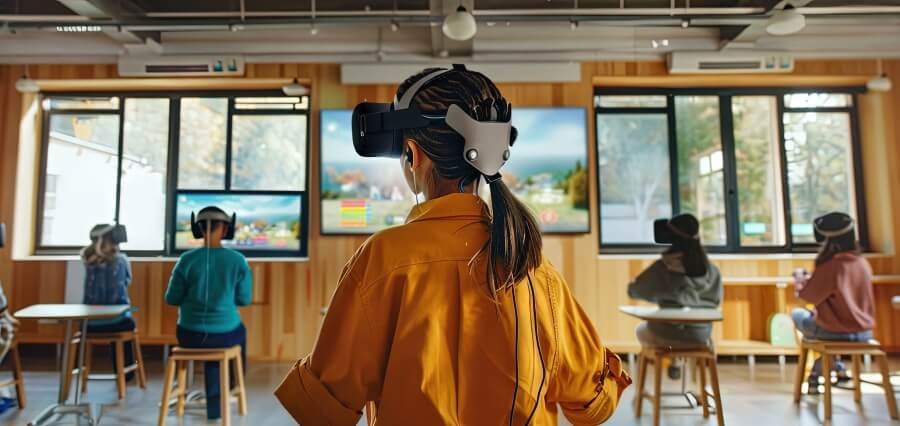Virtual Reality (VR) technology has evolved from a niche entertainment tool to a versatile platform with applications across various sectors, including education, healthcare, and beyond. By immersing users in digital environments, VR has the potential to revolutionize learning, therapy, and other domains by bridging gaps in access, engagement, and outcomes.
This article explores the transformative role of VR in addressing challenges and unlocking opportunities in education, healthcare, and beyond.
Enhancing Education Through Immersive Learning
VR offers a compelling solution to traditional educational limitations by providing immersive, interactive learning experiences. In VR-enabled classrooms, students can explore historical sites, conduct virtual experiments, and engage in collaborative problem-solving activities, transcending the constraints of time, space, and resources. By catering to diverse learning styles and preferences, VR fosters deeper understanding, retention, and engagement, while also promoting inclusivity and accessibility for learners with disabilities or special needs.
Revolutionizing Healthcare Delivery and Training
In healthcare, VR holds immense promise for improving patient outcomes, enhancing medical training, and transforming therapeutic interventions. From simulating surgical procedures to alleviating pain and anxiety through immersive experiences, VR enables healthcare professionals to practice skills, diagnose conditions, and deliver personalized care in a safe, controlled environment. Moreover, VR-based therapies offer innovative approaches for treating mental health disorders, phobias, and neurological conditions, empowering patients to confront and overcome challenges in immersive, supportive settings.
Bridging Social and Cultural Divides
VR has the power to transcend physical boundaries and connect people across distances, cultures, and perspectives. By simulating shared experiences and environments, VR fosters empathy, understanding, and collaboration among individuals from diverse backgrounds. Whether facilitating virtual meetings, cultural exchanges, or social interactions, VR promotes inclusivity, cross-cultural dialogue, and mutual respect, thereby bridging social divides and fostering global citizenship in an increasingly interconnected world.
Expanding Access to Opportunities
One of the most significant advantages of VR is its potential to democratize access to resources, experiences, and opportunities. In regions with limited infrastructure or resources, VR can serve as a cost-effective, scalable solution for delivering education, healthcare, training, and entertainment services. By reducing barriers to entry and expanding access to immersive experiences, VR empowers individuals and communities to overcome socioeconomic, geographic, and physical constraints, unlocking new pathways to learning, wellness, and economic empowerment.
Ethical and Social Implications
As VR technology continues to advance, it raises important ethical and social considerations related to privacy, consent, representation, and digital inequality. Safeguarding user data, ensuring informed consent, and promoting diversity and inclusion are paramount to building responsible VR ecosystems that prioritize ethical values and respect human rights. Moreover, addressing disparities in access, affordability, and digital literacy is essential for ensuring that the benefits of VR are equitably distributed and inclusive of all individuals and communities.
Skills Training and Professional Development
VR technology is increasingly being utilized for skills training and professional development across industries. From vocational training for trades like welding and plumbing to corporate simulations for leadership and team-building exercises, VR offers realistic, hands-on experiences that accelerate learning and skill acquisition. By providing immersive environments for practice and feedback, VR enables learners to develop competence and confidence in their abilities, ultimately enhancing workforce productivity and adaptability in rapidly evolving job markets.
Remote Collaboration and Telepresence
In an era of remote work and global connectivity, VR facilitates virtual collaboration and telepresence, enabling teams to work together seamlessly across distances. Immersive meeting spaces, virtual offices, and collaborative platforms allow colleagues to interact, brainstorm ideas, and collaborate on projects in immersive 3D environments, fostering creativity, innovation, and teamwork. VR also provides opportunities for remote education, training, and mentorship, connecting learners with experts and resources from around the world, regardless of geographical barriers.
Rehabilitation and Therapy
In healthcare, VR is revolutionizing rehabilitation and therapy by offering immersive interventions for physical and cognitive rehabilitation, pain management, and mental health treatment. VR-based therapies provide engaging, personalized experiences that motivate patients to adhere to treatment regimens and achieve better outcomes. Whether assisting stroke survivors with motor skills, alleviating chronic pain through distraction techniques, or treating PTSD through exposure therapy, VR interventions offer safe, controlled environments for healing and recovery.
Environmental Conservation and Sustainability
VR has emerged as a powerful tool for environmental conservation and sustainability efforts by raising awareness, promoting conservation behaviors, and fostering empathy for the natural world. Through immersive experiences such as virtual field trips, nature documentaries, and interactive simulations, VR allows users to explore and appreciate ecosystems, endangered species, and conservation challenges firsthand. By inspiring stewardship and advocacy, VR has the potential to mobilize collective action and drive positive change towards a more sustainable future for the planet.
Entertainment and Storytelling
Beyond its practical applications, VR continues to push the boundaries of entertainment and storytelling, offering immersive experiences that transport audiences to fantastical worlds, interactive narratives, and immersive performances. From virtual concerts and art exhibitions to immersive theater and storytelling experiences, VR blurs the line between reality and fiction, inviting users to engage with stories, characters, and environments in entirely new ways. As VR technology evolves, so too will the possibilities for creative expression and immersive entertainment experiences that captivate and inspire audiences worldwide.
In harnessing the transformative potential of Virtual Reality across these diverse domains, it is essential to recognize the ethical, social, and cultural implications of immersive technologies. By fostering responsible innovation, promoting inclusivity, and prioritizing human well-being, we can leverage VR to address pressing challenges, unlock new opportunities, and build a more connected, empathetic, and sustainable world for future generations.

